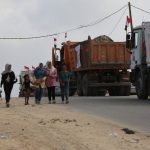Ongoing confrontations between the Sudanese Armed Forces (SAF) and the Rapid Support Forces (RSF), which began on 15 April when the RSF moved against the SAF have expanded to include other areas in Nyala and Al-Fashir in addition to the capital Khartoum and the Merowe air base.
Although the army has been conducting air raids on the RSF’s Central Command and its six main camps in Khartoum and has cut off the road to RSF supplies to Khartoum, the hit-and-run operations control the scene in many locations, especially in Khartoum, and it is not expected that any side will be able to quickly resolve the battle. However, the situation has calmed down at the Merowe base, which the army has confirmed it is beginning to regain control of.
The RSF Strategy
In the context of its rebellion against the Sudanese Transitional Sovereign Council (TSC), several points can be brought up that are reflective of the RSF’s plan.
The Initial Strike: The RSF struck first in a treacherous attempt to halt the SAF’s advance. The RSF saw a power imbalance favoring the army and decided to launch the attack to tip the scales back in their favor. In addition, they believed that their swift action would give them command of the country’s strategic facilities, such as Sudan Radio and Television to broadcast the first statement and the Republican Palace to declare the success of the rebellion, forcing the defending force to launch a counterattack and mobilize twice as many troops to regain command and control. It should be noted that the RSF deployment map completely encircles the country’s capital, Khartoum, from all tactical angles. That deployment was not haphazard, but rather deliberate in advance of such an operation. The SAF considered this in its assessment of the situation, and the merger process outlined in the draft agreement may have been developed with that goal in mind.
Timing of the Attack: At 9am on Saturday, during the busiest hour of the day for workers and university students in the country’s capital, the RSF began their movement. Considering the stakes, the timing of the attack came as a surprise. The RSF may have wagered that the army would back down out of concern for civilian casualties and retaliation.
TSC Overthrow: The assassination or capture of General Abdel-Fattah Al-Burhan, president of the TSC, was one of the RSF’s objectives. Heavy artillery was used to bombard Al-Burhan’s residence in Khartoum after the RSF failed to reach the Republican Palace, and they then moved on to the national radio and television station and the main headquarters of the SAF in the city.
Getting in the Way of Political Agreement: The military escalation, initiated by the RSF, stalled the final stages of the political agreement that had been underway since 6 April. The establishment of a single command structure was a point of contention between the two groups. All signs pointed to the fact that the formation of such a command within the context of a merger between the RSF and SAF will not happen given the reluctance of the commander of the RSF to come under the control of the TSC.
The SAF’s Position
The SAF were forced into a reactive role, and their strategy centered around crushing the RSF’s rebellion through forceful resolution of the command and control equation. In this vein, they proceeded in accordance with the following sequential steps:
Aerial Assaults: After observing the RSF’s movements for about three hours, the army decided to first launch an airstrike against RSF concentrations in the capital. Additionally, it targeted campsites in Soba, Karari, Taiba, Tayba Al-Hasanab, Al-Riyadh Baheri, and other areas. The army was also successful in bombing aid convoys headed for Khartoum. Given the RSF’s ability to move quickly and lightly thanks to its use of four-wheel drive vehicles, it is thought that the army chose to use its air force, which it alone possesses, because of how effective it is as a deterrent by targeting movements and sources of firepower.
Subsequent Statements: The SAF issued a number of statements, demonstrating their ability to control the media war. A series of statements followed, beginning with references to the “treacherous aggression” of the RSF, the SAF’s ability to command and control, specific information on the attacks targeting RSF targets and their movements, not only in the capital but also in other locations, such as Al-Fashir, Nyala, and Kassala, the announcement of the RSF’s dissolution as “rebel” forces, and finally the armed forces’ efforts to avoid escalation in the interest of civilians. Despite the contradictory information, preliminary indications point to the army’s claims being more reliable. For instance, the SAF command confirmed that the RSF have taken control of the TV headquarters, the sports city, and some other sites and that they are working to restore them. This is plausible given that a portion of the RSF are among those responsible for securing these facilities, making it simple to take control of these locations.
Military Expansion: In tandem with the air movement, the armed forces conducted a large-scale deployment operation, with the bulk of its 30,000-strong force stationed in the capital. They also recalled 15,000 troops, emphasizing that they would operate based on the worst-case scenarios. It was able to regain control of some sites as a result of this deployment, particularly those where military personnel seconded from the army were present and assisted in handing over those sites.
Possible Scenarios
Leaving out the Civil War: While statements and counter-statements from both sides of the escalation have clouded the situation, a civil war is still not a likely outcome. This is reflected in the SAF’s request that civilians refrain from participating in the ongoing battles, as well as the position of the political forces and the citizens, who recognize that the current conflict is a power struggle. Nonetheless, some analyses indicate apprehensions that Islamists from the former regime will enter the front lines to ignite the civil war and promote this scenario via social media.
Indecisiveness: This is the scenario most prevalent at the moment. While the use of air power has helped prevent the RSF from seizing control of the capital and other strategic locations, it appears the SAF were unable to maintain their aerial bombardment operations at night, leading to an escalation in heavy and medium artillery fire by the RSF after a brief lull after iftar. If the situation does not escalate into a street war in the capital, it is possible that the army will eventually be able to decide the battle due to the scales shifting in its favor.
A Time-Constrained Battle: It is unlikely that the war scenario between the two parties will last very long. This indicator is supported by the departures of the personnel on deputation in the RSF after the army announced the termination of their secondment, as well as the departures of the leadership, including the departure of the commander of the intelligence department in the RSF. This, combined with undermining support for the RSF, will weaken its movements, given the gaps the army can exploit in this setting. For example, while the RSF control the outer perimeter of Omdurman, the army can control the city from within. On the other hand, since Omdurman is home to so many military command centers, the RSF can easily maintain control over them.
Betting on Foreign Mediation: Currently, the common denominator between the two parties is betting on foreign mediation. Nevertheless, it appears that the nighttime escalation of the RSF involves a gamble on an attempt to make a military decision prior to the start of these mediations, following the failure to overthrow the TSC’s president. The SAF, meanwhile, have reiterated that they will not accept mediation unless and until the RSF is dissuaded.
Conclusion
Sudan has entered a new phase of armed escalation, and it is unlikely that the warring parties will be able to return to the negotiating table. While a civil war is not likely, achieving a stable and orderly political transition is also improbable, and the outcome of the current conflict will mark a turning point for political process changes. However, in general, no political path has a clear horizon anymore.
The lack of confidence in projects to combine paramilitary and military entities can be attributed to the disparities in their organizational structures and capabilities. Add that the foreign interventions and projects that invest in the RSF amid the conflicting demands of external agendas, and the result is the status quo. Therefore, it is crucial to comprehend the lesson of the state’s monopoly of force, prevent the presence of irregular forces from growing, and work to undermine them. Therefore, the same mistakes must not be made again through negotiations that place both parties on an equal footing or scale.
Most likely, the RSF view securing the back lines as a last resort before returning to Darfur and advancing as a rebel force from there. If the RSF take over key locations, camps, and airports in Darfur like El-Geneina airport, the SAF will be at a severe disadvantage. This is especially true when one considers the RSF’s average active force of between 3,000 and 50,000 troops, which makes it difficult to eliminate them.
This escalation proved that there is a rift between the top two men in the hierarchy of the transitional leadership in Sudan. It has also demonstrated that, in light of this struggle for power, any political agreement remains fragile, as mutual trust between the parties has been eroded and is difficult to rebuild.













